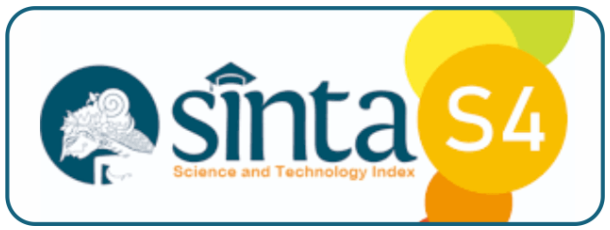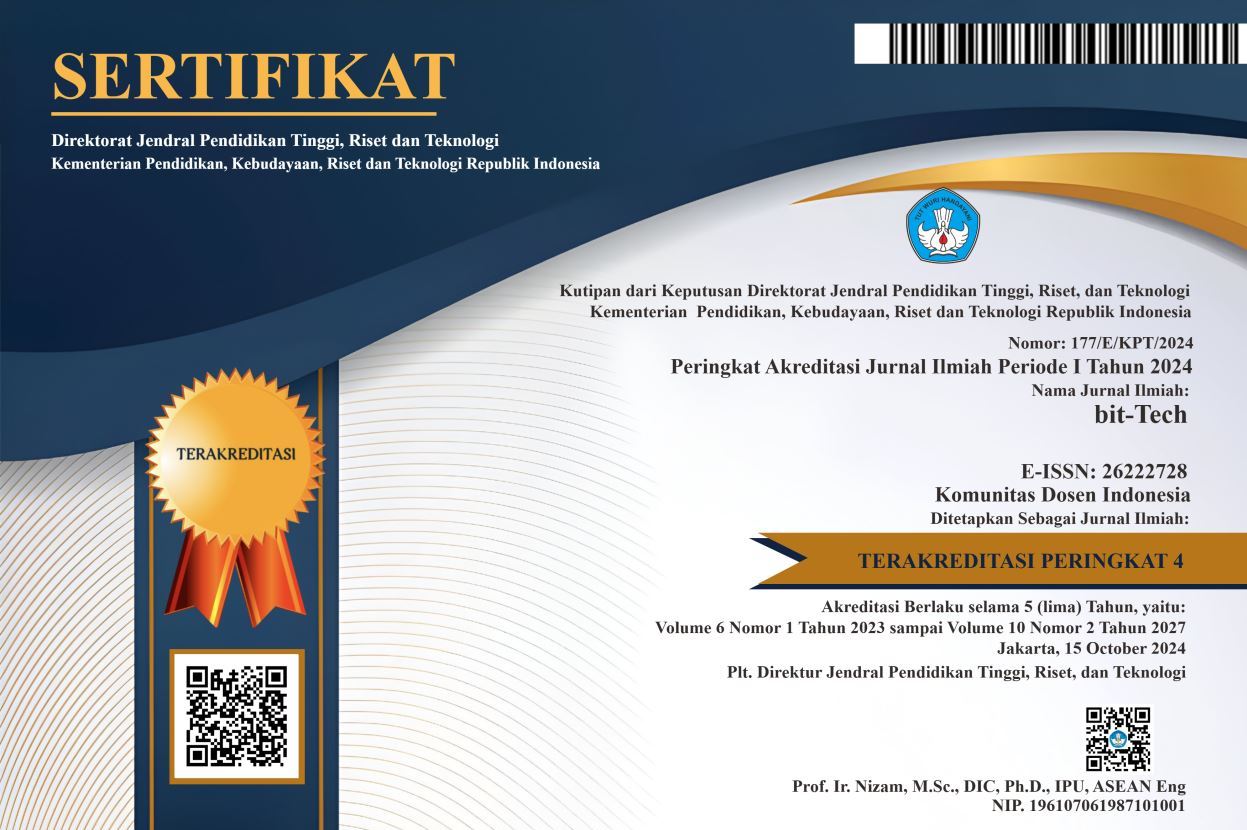Studi Perbandingan Pengembangan Game dalam GDScript dengan Godot dan C# dengan Unity
DOI:
https://doi.org/10.32877/bt.v7i3.1876
Keywords:
Game Development, Game Engine, GDScript, Godot, Unity
Abstract
Penelitian ini membandingkan efisiensi dan kompleksitas pada game engine Godot dan Unity dengan bahasa program utamanya masing-masing yaitu GDScript dan Unity dalam pembuatan replika Flappy Bird. Tujuan penelitian ini adalah untuk mengevaluasi waktu, penggunaan ruang berupa memori dan CPU, dan kompleksitas kode pada kedua game engine tersebut dan menganalisis perbedaan dalam bentuk kode. Hasil penelitian menunjukkan bahwa kedua engine mampu mencapai 60 FPS dengan stabil dalam dalam analisis time complexity. Pada analisis space complexity, Godot dengan GDScript terlihat lebih efisien dengan penggunaan memori 125 mb dan penggunaan CPU 3% dibandingkan Unity dengan C# yang memiliki penggunaan memori 160 mb dan penggunaan CPU 40%. Dari segi code complexity, Godot dengan GDScript memiliki lebih sedikit jumlah baris kode atau Lines of Code (LOC) dengan total 157 sedangkan Unity dengan C# memiliki total LOC sebanyak 169. Dalam penulisan kode, Unity dengan C# dapat menggunakan komponen dari fitur bawaan game engine Unity yang dimiliki seperti Rigidbody2D yang mempermudah dan mempercepat dalam pembuatan mekanika seperti gravitasi. Tetapi komponen tersebut perlu diinisialisasikan di dalam kodenya yang dapat menambahkan jumlah LOC. Sedangkan Godot dengan GDScript tidak memiliki fitur bawaan seperti Unity dan harus membuat mekanika seperti gravitasi dari awal tetapi karena itu, GDScript tidak memerlukan inisialisasi komponen dari game engine Godot dan karena itu jumlah LOC yang dimiliki lebih sedikit dibandingkan dengan C#.
Downloads
References
H. Ali and J. Al Lawati, “The Path of UNITY or the Path of UNREAL? A Comparative Study on Suitability for Game Development,” 2020. doi: https://doi.org/10.47611/jsr.vi.976.
M. Danial Masood, “Comparison of Programming Languages in Game Development,” pp. 19–1210, 2020, doi: 10.13140/RG.2.2.33042.89287.
I. Wayan, A. Putra Yasa, N. Putu, and D. Yasa, “TAJOG RUN GAME VISUAL ASSET DESIGN,” Journal of Aesthetics, Design, and Art Management, vol. 4, 2024, doi: 10.58982/jadam.v4i1.663.
A. Jungherr and D. B. Schlarb, “The Extended Reach of Game Engine Companies: How Companies Like Epic Games and Unity Technologies Provide Platforms for Extended Reality Applications and the Metaverse,” Social Media and Society, vol. 8, no. 2, Apr. 2022, doi: 10.1177/20563051221107641.
M. Toftedahl and H. Engström, “A Taxonomy of Game Engines and the Tools that Drive the Industry,” 2019.
Yegoshyna G.A, Voronoy S.M, and Ovdieichuk A.A, “LEARNING SYSTEM DESIGN FOR GAME APPLICATIONS,” 2020. doi: https://doi.org/10.33243/2518-7139-2020-1-2-82-91.
F. Hussain, A. Hussain, H. Shakeel, N. Uddin, and T. L. Ghouri, “Unity Game Development Engine: A Technical Survey,” 2020, [Online]. Available: http://sujo.usindh.edu.pk/index.php/USJICT/
M. Ranaweera and Q. H. Mahmoud, “Deep Reinforcement Learning with Godot Game Engine,” Electronics (Switzerland), vol. 13, no. 5, Mar. 2024, doi: 10.3390/electronics13050985.
N. Amalin et al., “Tales of C++ Worlds: C++ Programming Language Game-Based Learning,” vol. 5, no. 1, pp. 223–231, 2023, doi: 10.30880/mari.2024.05.01.031.
T. K. Mohd, F. Bravo-Garcia, L. Love, M. Gujadhur, and J. Nyadu, “Analyzing Strengths and Weaknesses of Modern Game Engines,” International Journal of Computer Theory and Engineering, vol. 15, no. 1, pp. 54–60, Feb. 2023, doi: 10.7763/IJCTE.2023.V15.1330.
M. S. Naveed, “Comparison of C++ and Java in Implementing Introductory Programming Algorithms,” Quaid-e-Awam University Research Journal of Engineering Science & Technology, vol. 19, no. 1, pp. 95–103, Jun. 2021, doi: 10.52584/qrj.1901.14.
A. Kaur and R. Nayyar, “A Comparative Study of Static Code Analysis tools for Vulnerability Detection in C/C++ and JAVA Source Code,” in Procedia Computer Science, Elsevier B.V., 2020, pp. 2023–2029. doi: 10.1016/j.procs.2020.04.217.
M. S. Khoirom, M. Sonia, B. Laikhuram, J. Laishram, and D. Singh, “Comparative Analysis of Python and Java for Beginners,” International Research Journal of Engineering and Technology, 2020, [Online]. Available: www.irjet.net
J. W. P. Johansson, “A quantitative comparison between C, C++ and Rust Loading data in the context of a game engine,” 2023.
T. Brogan, J. Springer, T. Ringenberg, D. Whittinghill, and C. Laux, “EVALUATING THE EFFICIENCY OF GENERAL PURPOSE AND SPECIALIZED GAME ENGINES FOR 2D GAMES THE PURDUE UNIVERSITY GRADUATE SCHOOL STATEMENT OF COMMITTEE APPROVAL,” 2024.
I. Yakut, “The Basics of Corpus Linguistics: An Introduction for Beginners,” 2022. [Online]. Available: https://www.cizgikitabevi.com/kitap/1564-yabanci-dil-ogretimine-genel-bir-bakis-vi
A. V. Magistrant, “BASIC THEORETICAL PRINCIPLES OF CORPUS LINGUISTICS,” 2022, doi: 10.17605/OSF.IO/36RWP.
S. Bhuyan, S. Zhao, Z. Ying, M. T. Kandemir, and C. R. Das, “End-to-end Characterization of Game Streaming Applications on Mobile Platforms,” in Proceedings of the ACM on Measurement and Analysis of Computing Systems, Association for Computing Machinery, Mar. 2022. doi: 10.1145/3508030.
T. Salmela, “Game Development Using the Open-Source Godot Game Engine,” 2022.
Downloads
Published
How to Cite
Issue
Section
License
Copyright (c) 2025 bit-Tech

This work is licensed under a Creative Commons Attribution-ShareAlike 4.0 International License.
I hereby assign and transfer to bit-Tech all exclusive copyright ownership rights to the above work. This includes, but is not limited to, the right to publish, republish, downgrade, distribute, transmit, sell, or use the work and other related materials worldwide, in whole, or in part, in all languages, in electronic, printed, or any other form of media, now known or hereafter developed and reserves the right to permit or license a third party to do any of the above. I understand that this exclusive right will belong to bit-Tech from the date the article is accepted for publication. I also understand that bit-Tech, as the copyright owner, has sole authority to license and permit reproduction of the article. I understand that, except for copyright, any other proprietary rights associated with the work (e.g. patents or other rights to any process or procedure) must be retained by the author. In addition, I understand that bit-Tech permits authors to use their papers in any way permitted by the applied Creative Commons license.

 DOI :
DOI :
 Abstract views: 37
/
Abstract views: 37
/  PDF downloads: 20
PDF downloads: 20











